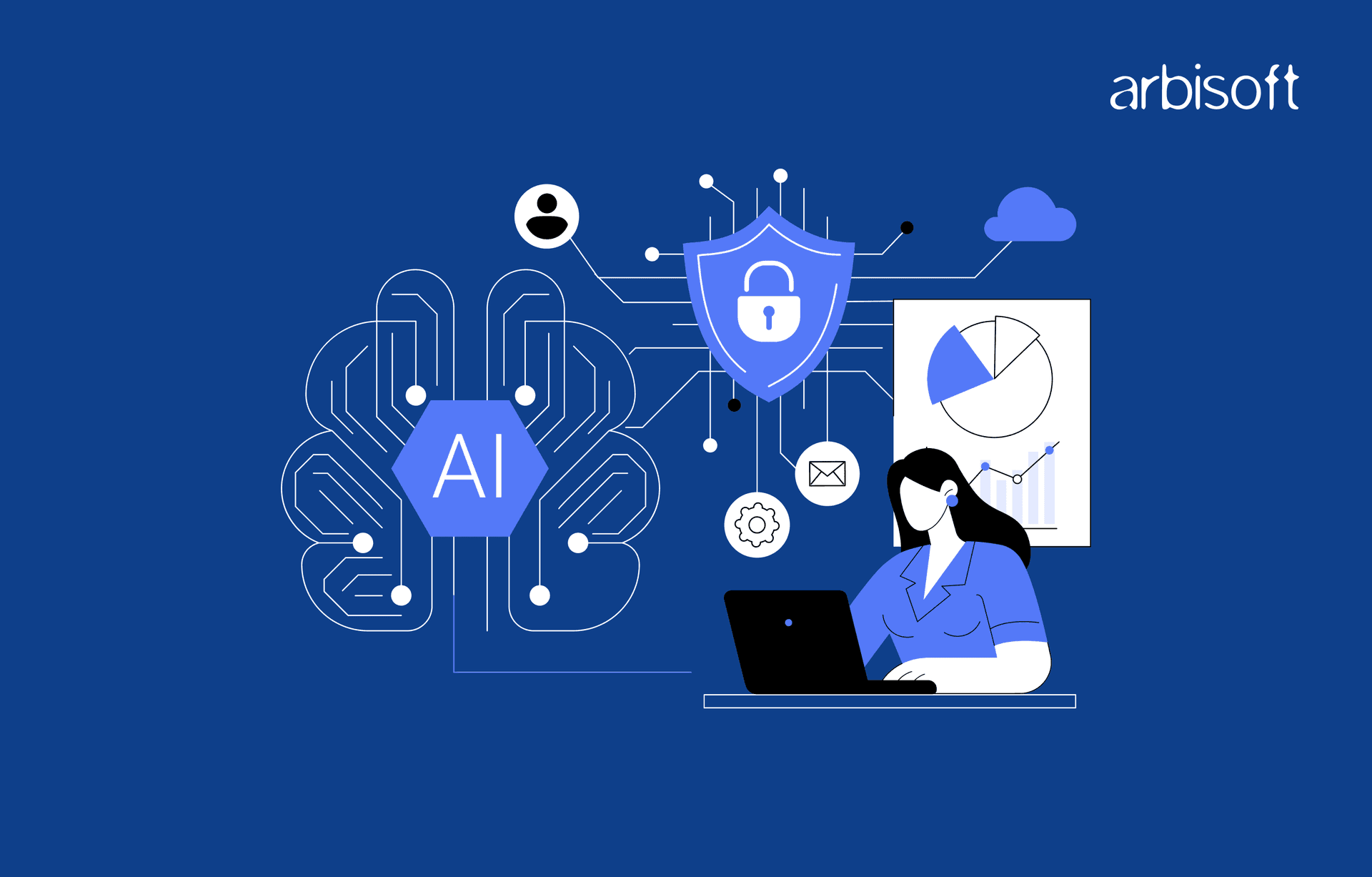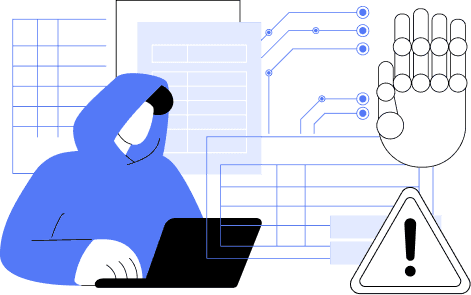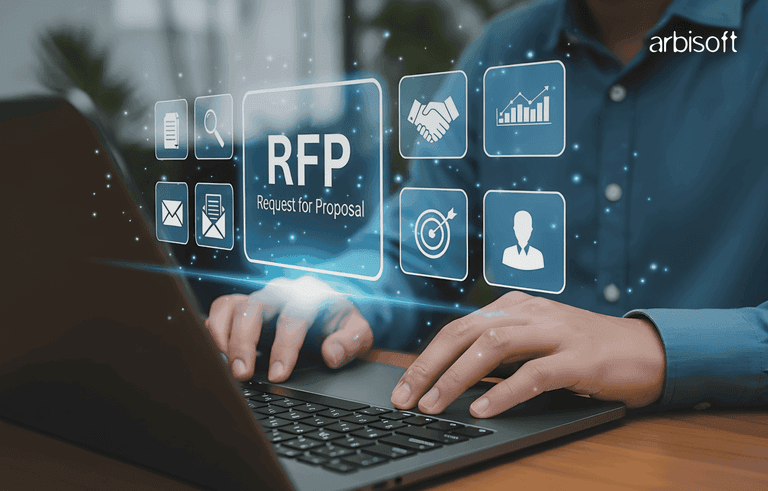We put excellence, value and quality above all - and it shows




A Technology Partnership That Goes Beyond Code

“Arbisoft has been my most trusted technology partner for now over 15 years. Arbisoft has very unique methods of recruiting and training, and the results demonstrate that. They have great teams, great positive attitudes and great communication.”
10 Ways to Protect Your Business Using AI in Cybersecurity

Cybersecurity threats are ever-evolving and increasingly dangerous in today’s world. So how do you keep your company’s digital defenses up to the mark when hackers are getting smarter every day? Old security methods just won’t cut it anymore.
Businesses today face a growing wave of cyberattacks, like phishing emails and ransomware, that can wreak havoc on important data and systems. Traditional security tools often struggle to catch these threats quickly, leaving valuable information at risk.
This is where Artificial Intelligence comes in, of course. AI offers smarter and faster ways to spot and handle cyber threats. It detects suspicious activities in real-time, automatically responds to attacks, and predicts potential security issues before they happen.
In this blog, we’ll look at ten ways AI can help protect your business from cyber threats. You’ll learn how AI can improve your security measures, from stopping phishing attempts to managing vulnerabilities, helping you stay ahead of hackers and keep your business safe. So let's get started.
Maximize Your Cybersecurity with these 10 Ways
Using Artificial Intelligence (AI) in cybersecurity can greatly improve your defense systems. Here are ten ways AI can help protect your business from cyber threats:
1. Threat Detection and Prevention
- Real-Time Analysis: AI can quickly analyze huge amounts of data to find unusual activities that might be dormant threats. It can spot patterns that show something is wrong, like logging in at odd hours or from unfamiliar places. For instance, AI-powered cybersecurity platforms like Darktrace and CrowdStrike quickly analyze large amounts of data to find unusual activities that might be dormant threats.
- Advanced Threat Intelligence: AI gathers threat information from many sources to give a full picture of possible dangers. This helps businesses stay ahead of new threats and take action to stop attacks before they ever happen. Applications like IBM QRadar and Splunk gather threat information from many sources to provide a full picture of possible dangers.
- Zero-Day Threat Detection: AI can identify unknown threats faster than traditional systems by analyzing behavior patterns, offering timely protection against new types of attacks. Platforms like Cylance and FireEye use AI to identify unknown threats faster than traditional systems by analyzing behavior patterns, offering timely protection against new types of attacks.
2. Automated Response
- Immediate Actions: When a threat is found, AI solutions like ike Cisco SecureX and Palo Alto Networks Cortex XSOAR can quickly isolate the affected systems, block harmful IP addresses, and stop suspicious processes. This quick response can prevent the spread of malware and reduce damage.
- Incident Response Plans: AI follows set plans to handle threats, making sure actions are consistent and effective. This reduces the need for manual intervention and speeds up the response time. AI tools like Siemplify and Swimlane follow set plans to handle threats, ensuring consistent and effective actions.
- Incident Playbooks: AI can carry out detailed steps during incidents to make sure all necessary actions are taken and no important details are missed.
3. Predictive Analytics
- Forecasting Threats: By studying patterns and trends, AI-driven platforms like Fortinet and Rapid7, along with predictive analytics solutions, can forecast potential attack methods and help businesses prepare by strengthening weak areas.
- Risk Assessment: Solutions such as Bitdefender and Qualys use AI to assess the likelihood of different types of attacks, helping businesses focus resources on the most probable threats.
- Proactive Defense: By predicting threats before they occur, AI-powered tools like ThreatConnect and Anomali enable businesses to be proactive instead of just reacting to attacks.
Don't leave your business vulnerable to cyber threats.
Download our Threat Analysis Guide now and gain the insights you need to protect your assets effectively.

Act now to safeguard your company’s future!
Secure your business and stay ahead of potential threats with our expert insights.

4. Behavioral Analysis
- User Monitoring: AI-based security solutions like Vectra AI and Exabeam monitor user behavior to detect anything unusual. For example, if an employee’s access habits change suddenly, AI can flag this for further investigation.
- Insider Threat Detection: Tools such as ObserveIT and Gurucul detect potential insider threats by analyzing behavior, such as employees accessing sensitive data they normally wouldn't or unusual data transfers.
- User and Entity Behavior Analytics (UEBA): Platforms like Splunk and Securonix use AI to learn normal behavior patterns and identify deviations that indicate compromised accounts or insider threats.
5. Phishing Detection
- Email Scanning: Incoming emails are scanned for signs of phishing, such as suspicious links, unusual sender addresses, and deceptive content. AI-based email security solutions like Mimecast and Proofpoint scan incoming emails for signs of phishing.
- Contextual Analysis: By understanding the context of email content, AI can better spot clever phishing scams.
- Natural Language Processing (NLP): Solutions like Tessian and Area 1 Security use NLP to improve the accuracy of phishing detection by interpreting the content of emails.
6. Fraud Detection
- Transaction Monitoring: AI-driven financial security platforms like SAS and Actimize analyze financial transactions in real-time to spot fraud. It looks for patterns linked to fraud, such as unusual transaction amounts or locations.
- Behavioral Biometrics: Artificial intelligence can verify user identities and detect fraud by analyzing typing patterns and mouse movements. Tools like BioCatch and TypingDNA verify user identities and detect fraud by analyzing typing patterns and mouse movements.
- Adaptive Learning: AI systems like Kount and Fraud.net continuously learn and adapt to new fraud tactics, staying ahead of fraudsters who constantly change their methods.
7. Endpoint Security
- Continuous Monitoring: AI-based endpoint security solutions like SentinelOne and Cylance ensure that all endpoints, such as computers and mobile devices, are always monitored for threats. They can detect and remove malware, ransomware, and other malicious software in real time.
- Adaptive Security: By learning from past incidents, AI solutions like CrowdStrike and Sophos keep updating their methods to ensure endpoint security is always up to date.
- Behavioral-Based Protection: AI can detect threats based on the behavior of applications and processes, offering protection against unknown malware.
8. Network Security
- Traffic Analysis: AI solutions like Darktrace and Vectra AI can easily monitor network traffic to detect any unusual activity that might be a cyber threat. It can identify patterns of malicious traffic and block them.
- Intrusion Detection Systems (IDS): AI-powered IDS such as Snort and Suricata can find and respond to network intrusions more effectively than traditional systems by analyzing network packets for signs of attacks.
- Automated Threat Hunting: AI like IBM QRadar and FireEye automate the process of searching for signs of compromise within the network.
9. Vulnerability Management
- Continuous Scanning: AI-powered tools like Tenable and Qualys regularly scan systems for vulnerabilities such as outdated software or incorrect settings, identifying and prioritizing them based on their severity.
- Automated Patching: Solutions like Automox and Ivanti automate the process of fixing vulnerabilities, ensuring they are quickly addressed to keep systems secure.
- Predictive Vulnerability Management: Platforms like Kenna Security and Rapid7 predict which vulnerabilities are most likely to be exploited, allowing businesses to prioritize critical fixes.
10. User Authentication
- Multi-Factor Authentication (MFA): AI-enhanced MFA solutions like Duo Security and Okta add biometric data like fingerprints or facial recognition, making it harder for unauthorized users to access sensitive information.
- Adaptive Authentication: Authentication requirements are adjusted by artificial intelligence tools like ForgeRock and Ping according to risk factors, such as the user's location or the sensitivity of the data being accessed.
- Behavioral Biometrics: Platforms like BehavioSec and Zighra continuously verify users based on their unique behaviors, such as typing patterns and navigation habits.
Arbisoft's Cybersecurity Services
Arbisoft’s cybersecurity services protect your business with advanced data security, strong security checks, thorough vulnerability assessments, and custom cybersecurity training. Our approach ensures that your digital assets are safeguarded against the evolving landscape of cyber threats.
We offer comprehensive performance and security solutions that include encryption, secure access controls, and continuous monitoring to protect sensitive information. Our security governance team conducts thorough security audits, identifying vulnerabilities and providing solutions for risk management. We also offer Vulnerability Assessment and Penetration Testing services to protect your information infrastructure against data breaches.
Our custom cybersecurity training programs equip your team with the knowledge and skills needed to recognize and respond to cyber threats effectively. With certifications such as CISSP, OSCP, and CEH among our team, you can trust us to keep your business safe.
Contact us now to safeguard your business and fortify your defenses against cyber attacks.
Staying Ahead with AI in Cybersecurity
Using AI in cybersecurity is essential for businesses today. With cyber threats becoming more advanced, Artificial Intelligence provides the necessary tools to protect your business effectively. By implementing these ten AI-driven strategies, you can ensure your business stays ahead of cybercriminals.
AI is changing cybersecurity by offering new ways to detect, prevent, and respond to threats. From automated responses to predictive analytics, AI provides a strong defense against the constantly evolving landscape of cyber threats. Investing in AI-driven cybersecurity solutions is a proactive step toward securing your business's future.
























